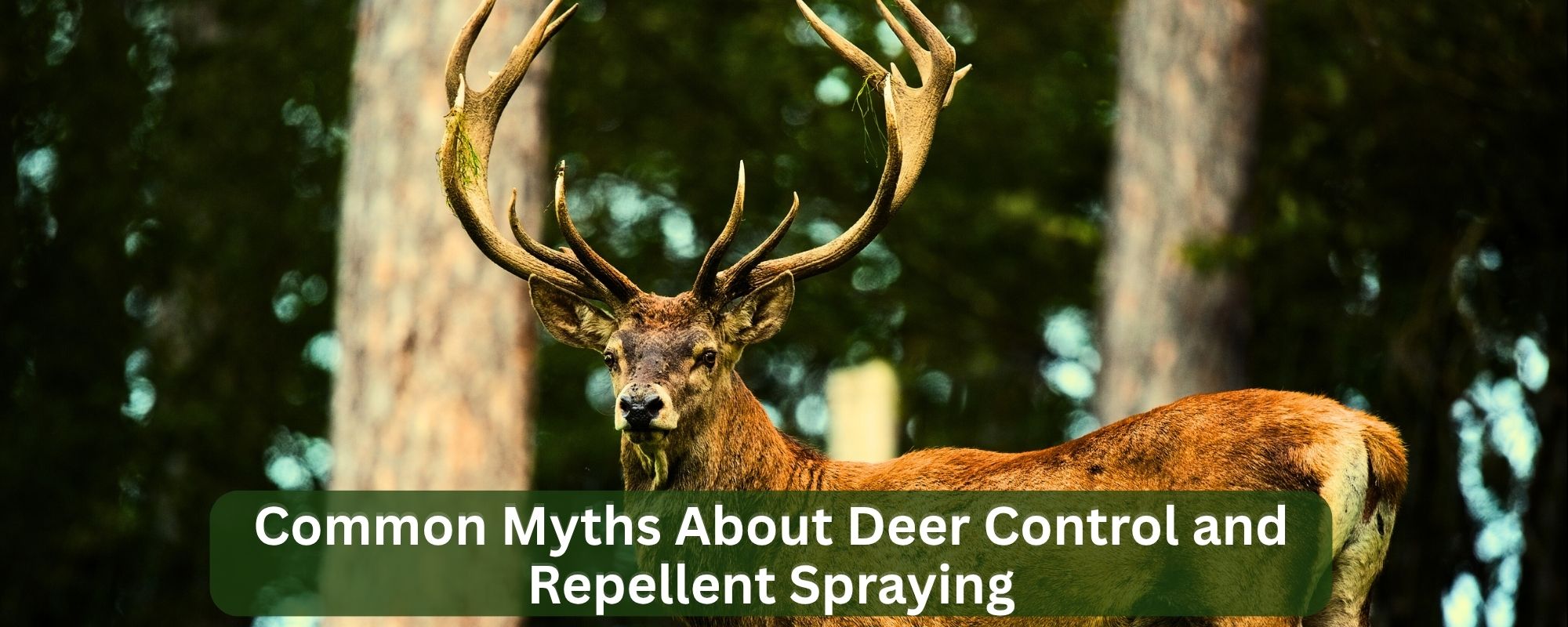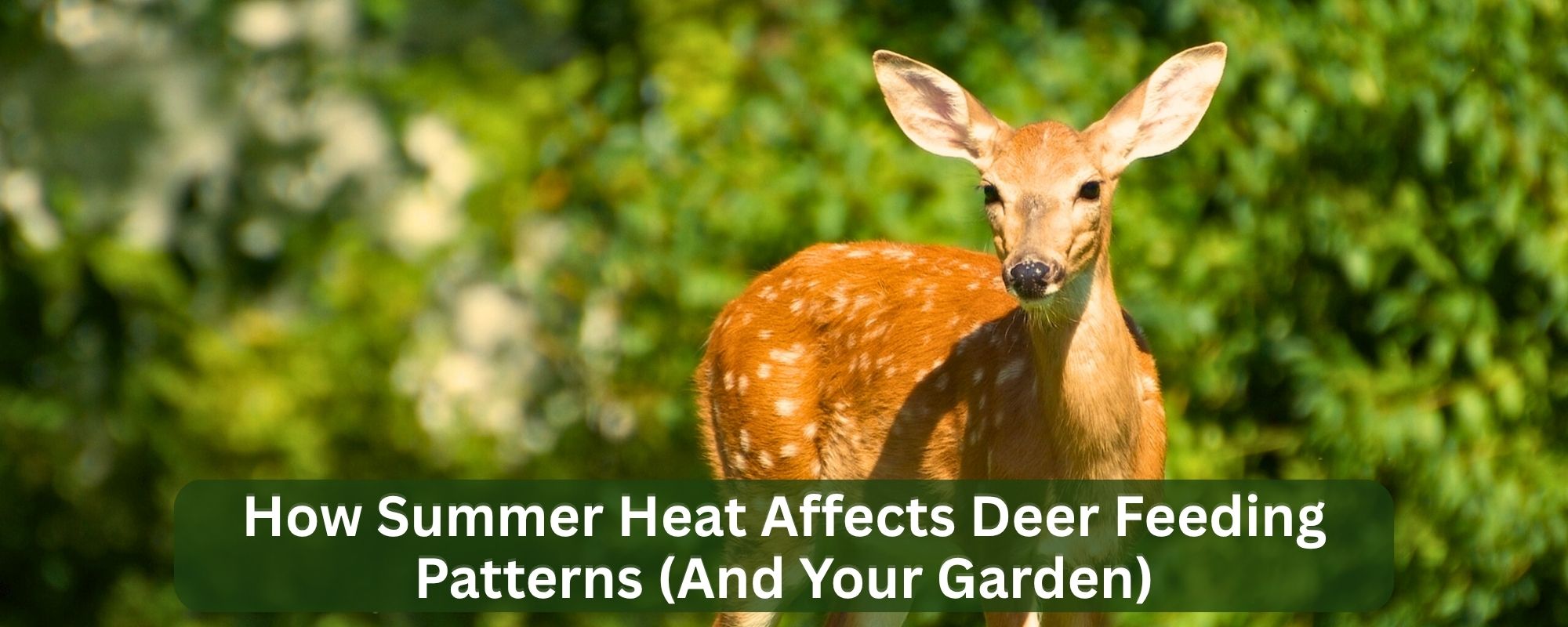Common Myths About Deer Control and Repellent Spraying

Deer can cause significant damage to your garden, trees, and landscaping, which is why deer control is essential for many homeowners, especially in areas like New York and New Jersey. While there are various ways to protect your property from deer damage, deer repellent spraying is one of the most popular methods. However, there are numerous myths surrounding deer control and deer repellent sprays that can lead to confusion or ineffective strategies.
In this blog, we’ll debunk some of the most common myths about deer control and repellent spraying, so you can make informed decisions to protect your property effectively.
1. Myth #1: Deer Won’t Be Deterrent by Repellent Sprays
One of the most widespread myths about deer repellent sprays is that they simply don’t work. Some believe that deer are immune to the effects of repellents, or that once they get a taste of the plants, they won’t be deterred.
Truth:
Deer repellents do work, but their effectiveness depends on several factors, including the type of repellent used, the application method, and the consistency of reapplications. Deer repellent sprays contain natural ingredients like garlic or peppermint oil, which deer find unpleasant and will avoid. When applied correctly, repellent sprays create a protective barrier that deters deer from browsing on your plants.
Why It’s Effective:
- Creates an unpleasant experience: Deer associate the taste or smell of the repellent with an unpleasant feeding experience, causing them to avoid the area.
- Safe and eco-friendly: Our natural, non-toxic formulas make it safe for pets, children, and the environment while still being highly effective.
- Regular reapplication: Consistent reapplications ensure long-lasting protection, especially after rain or watering.
2. Myth #2: All Deer Repellents Are the Same
Many people assume that all deer repellent products work the same way, but this is far from true. There are various types of deer repellents on the market, and they each work in different ways, offering varying levels of effectiveness.
Truth:
Not all deer repellents are created equal. Deer repellents can be broadly categorized into scent-based and taste-based repellents, each having unique properties:
- Scent-based repellents: These use strong odors (such as garlic, peppermint, or rotten eggs) that deer find unpleasant. These sprays work best when applied regularly.
- Taste-based repellents: These make the plants taste bad to deer, discouraging them from feeding. Ingredients like capsaicin (from hot peppers) or bittering agents are often used.
Why It’s Important to Choose the Right Repellent:
The effectiveness of your deer repellent depends on your location, the type of plants you are protecting, and the deer’s feeding habits. Choosing the right product for your needs ensures better results. At Deer Guys, we offer weather-resistant formulas designed for long-lasting protection against deer, even in the toughest weather conditions.
3. Myth #3: Deer Only Eat Certain Plants, So Repellent Isn’t Necessary
Another common myth is that deer only eat certain types of plants, meaning you can just avoid planting the types of plants they prefer. As a result, some people believe deer repellents are unnecessary if they aren’t growing deer-attractive plants.
Truth:
While it’s true that deer have preferences, they will eat almost anything when food is scarce. Deer will often eat flowers, shrubs, young trees, fruits, vegetables, and even ornamental plants when they are hungry enough. Additionally, deer tend to feed in cycles and can switch between different types of plants.
Why Repellent Is Essential:
Deer won’t hesitate to eat non-deer-resistant plants if they are hungry enough, especially during the rut season or winter, when natural food sources are scarce. Deer repellent sprays help prevent grazing damage by keeping deer away, even from plants they typically wouldn’t target.
4. Myth #4: Deer Will Get Used to Repellent Sprays Over Time
Some people believe that deer will eventually become accustomed to the scent or taste of repellent sprays, rendering them ineffective over time. This myth suggests that once deer experience the repellent once, they will ignore it.
Truth:
Deer are highly sensitive to their environment, and while they may initially investigate a new scent or taste, consistently applying the repellent will ensure they stay away. Over time, deer learn to associate the unpleasant experience with the smell or taste, making them less likely to return.
Why It Works:
- Deer’s strong sense of smell: Deer rely heavily on their sense of smell to identify food and danger. Scent-based repellents take advantage of this by creating an overpowering odor that deer find unbearable.
- Long-term effectiveness: When applied consistently, deer repellent sprays create a barrier that deer avoid, as they do not like the sensation or taste.
5. Myth #5: Fencing Is a Better Solution Than Repellent Sprays
While fencing is an effective physical barrier, many believe that it’s the only solution for keeping deer out. People often assume that deer repellent spraying is less effective or more difficult to maintain than installing a fence around the property.
Truth:
Fencing can certainly work, but it is often expensive, unsightly, and challenging to maintain, especially if your property is large. Deer repellent sprays, on the other hand, are affordable, easy to apply, and can be used on a variety of plants without the need for permanent structures.
Why Repellent Sprays are Convenient:
- Cost-effective: Repellents are significantly less expensive than installing fencing, and they’re much easier to apply.
- Less invasive: Unlike fences, deer repellents won’t block your view or take up space on your property.
- Adaptable: Deer sprays can be applied to specific areas (such as flower beds or young trees) that need protection.
6. Myth #6: Deer Repellent Sprays Are Harmful to the Environment
Some homeowners worry that deer repellent sprays may harm the environment or their plants due to the chemicals used. There’s a belief that chemical repellents can damage soil, harm beneficial insects, or pollute water sources.
Truth:
At Deer Guys, we use natural, eco-friendly ingredients in our deer repellent sprays, so you can protect your plants without causing harm to the environment. Our formulas are safe for pets, family, and the local wildlife.
Why Eco-Friendly Matters:
- Non-toxic ingredients: We focus on natural repellents that work without harmful chemicals, making them safer for you and your surroundings.
- Sustainable solutions: Our weather-resistant formulas are designed to provide long-term protection without damaging the environment.
Why Choose Deer Guys for Deer Control?
At Deer Guys, we are dedicated to providing effective, eco-friendly deer control solutions that work for every season. Our deer repellent sprays are designed to protect your landscape from damage, all while ensuring safety for your plants, pets, and family.
Why We Stand Out:
- Custom solutions: We offer personalized deer control plans based on the unique needs of your property.
- Eco-friendly and safe: Our natural ingredients ensure that your yard remains protected without harming the environment.
- Regular service: We offer consistent follow-up services to ensure your property remains deer-free throughout the year.
Related Services
- Deer Repellent Spraying Service – Learn more about how our professional spraying service keeps your yard safe from deer damage.
- Our Products – Explore the safe, natural ingredients in our deer repellent.
- Weather-Resistant Formula – See how our formula withstands harsh weather conditions.
- Contact Us – Reach out today to schedule your first deer repellent application.
Final Thoughts: Don’t Fall for Deer Control Myths
With so much misinformation about deer control, it’s important to separate fact from fiction. Deer repellent sprays are highly effective when applied correctly, and they provide an affordable, eco-friendly solution for protecting your property. By understanding the truth behind common myths, you can make informed decisions to keep your yard safe from deer damage year-round.
Contact us today to schedule your deer repellent application and protect your landscape from deer damage!




